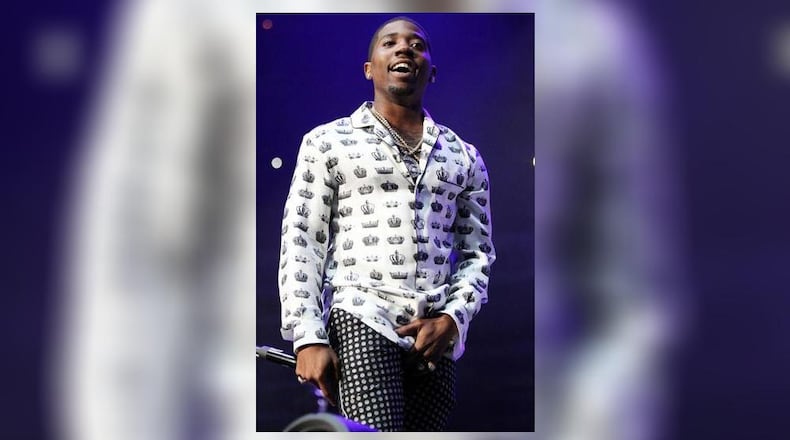Twelve alleged members of the Bloods gang were named Monday in a 105-count indictment that uses social media posts and songs by one of its suspected members, rapper YFN Lucci, as evidence that prosecutors say proves coordinated criminal activity.
In Lucci’s case, Fulton County prosecutors say the image that’s helped catapult him to musical stardom is no act.
Lucci, whose real name is Rayshawn Bennett, already faces an unrelated murder charge for allegedly driving three other purported gang members into rival territory last December, where police say they opened fire with assault-style rifles, killing an Atlanta man.
Bennett is out on bond but will be required to turn himself in due to the new charges, all of which fall under Georgia’s Racketeer Influenced and Corrupt Organizations (RICO) Act. Fulton District Attorney Fani Willis said the indictments of the suspected Bloods members, which she called “unprecedented” in its scope, will be the first of several to come targeting street gangs.
The indictment is the product of a beefed-up gang unit, aided by two of Willis’ big-name recruits, Mike Carlson, an expert on organized crime law, and RICO specialist John Floyd. They teamed with lead gang unit prosecutor Cara Convery to put together a comprehensive set of charges ranging from theft to aggravated assault to weapons violations.
They constitute a “pattern of racketeering activity” in that the acts were committed “in furtherance of one or more incidents, schemes, or transactions that had the same or similar intents, results, accomplices, victims, or methods of commission or otherwise were interrelated by distinguishing characteristics,” the indictment states.
Willis said RICO provides prosecutors with an opportunity to “paint the big picture.”
“I’m very comfortable with using RICO,” she said. “I will be using this mechanism throughout my tenure.”
Many of the counts appear, on the surface, to be somewhat innocuous. But prosecutors say an important element to their case is proving the defendants are aligned with or are members of the Bloods.
Social media became a useful tool to that end. Defendant Artez Carter, aka “Tez,” posted a picture of himself posing with multiple alleged Blood gang associates “displaying Blood gang hand signs and firearms,” the indictment claims.
Another of the alleged gang members named in the indictment, Dereck Adams also known as “Drip,” posted a picture of himself wearing a “YFN” pendant necklace with other purported Blood gang associates, one of whom formed his hand in the shape of a pistol and pointed it at the camera. Underneath, the caption reads, “The Opps They Know Where we At It Ain’t Like We Hiding.” Prosecutors say this is proof of gang affiliation.
In Bennett’s case, prosecutors cite a video in which the rapper appears with a handgun and makes an allegedly threatening statement that, according to prosecutors, “demonstrates an association with the enterprise and enhances the successful and intimidating reputation of the enterprise.”
“I think that it sends a significant message, a profound message that regardless of your status that the City of Atlanta and Fulton County in partnership is coming after you if you violate the crimes in our county, in our city,” Atlanta Police Chief Rodney Bryant said.
Bennett, 29 is best known for his songs “Key to the Streets” and “Everyday We Lit.” Bennett faces a slew of new charges, including an assault charge for a 2020 incident in which he allegedly choked a man and encouraged his beating because he played music associated with a rival gang. The rapper’s attorney, Drew Findling, told Channel 2 Action News, his client does not belong to any gang.
“What he is is an internationally recognized musical artist that is a triple platinum winner, that has performed all over the United States and all over the world,” Findling said. “His First Amendment right to musically express himself is no different than the famous rock song ‘I Shot the Sheriff.’ It’s not criminal activity.”
Local subsets of the Bloods targeted by prosecutors included the Inglewood Family Gangster Bloods, Atlanta Blood Gang and the Bloodhounds/13th Avenue. While the Bloods were formed in Los Angeles they have affiliates across the country.
The investigation that produced the indictments followed more than six months of investigation and involved the DA’s office, the GBI, Atlanta police and the Fulton sheriff’s office. Rebuilding relationships with state and local law enforcement agencies was crucial, Willis said.
For instance, her predecessor was denied access to recordings of phone calls placed inside jails from one gang member to another. Those calls were key to building the case against the Bloods, said Willis, who, along with new Fulton Sheriff Pat Labat, took office in January.
Ken Howard, special agent in charge of the GBI’s Gang Task Force, estimated anywhere from 70 to 90 percent of crimes committed in the state have at least some gang connection.
About the Author
The Latest
Featured



